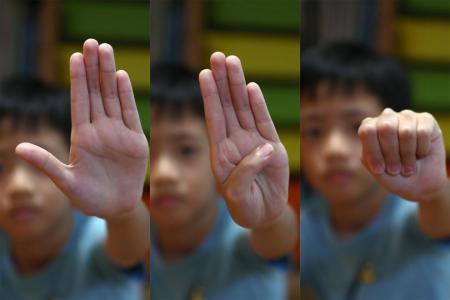Kids who face domestic abuse can use Signal for Help sign to seek help
Over the past year, the Covid-19 pandemic has made it harder for children who are victims of abuse to seek help, as home-based learning and more time stuck at home have limited their social interactions.
It is more important now than before to let children know about non-verbal ways to ask for help, said social workers at a symposium on child abuse yesterday.
Singapore recorded the highest number of child abuse cases in a decade last year, with the Ministry of Social and Family Development's (MSF) Child Protective Service receiving more than 5,200 inquiries.
Participants of the symposium, organised by charity organisation Casa Raudha, shared their struggles in trying to help children facing domestic abuse. They said that during welfare checks via Zoom calls, the young charges were too scared to speak up about what they were facing as their parents would be in the room.
Minister of State for Social and Family Development Sun Xueling said MSF's Break the Silence campaign will adopt a hand signal as its new logo from this month to reflect one possible non-verbal cue victims can use to get help.
The Signal for Help gesture was developed by the Canadian Women's Foundation. It is done by first holding one hand up with the thumb tucked into the palm, and then folding the other four fingers down over the thumb.
Ms Sun said: "Our worry is that when we do not see the children, we do not know what is happening to them. And in a Covid-19 environment, our social workers sometimes are not able to pay house visits, and they perhaps will interact with these children through videos."
She added that this signal will be a way to seek help for those who cannot verbally do so.
"You can do this (signal) in front of you. It says: 'Help'," she said.
The signal made its rounds on social media and news outlets when a 16-year-old girl in the US was saved from her abuser after flashing the signal to passing cars earlier this month.
Guest speaker Razwana Begum Abdul Rahim, a senior lecturer at the Singapore University of Social Sciences, said the pandemic has made some homes a dangerous place due to stress from unemployment and financial difficulties.
"Despite the advancements in our policies, legislation and practice, our children are not safe," she added.
"As (social) workers, we have been challenged to rise above and beyond to help now."
Get The New Paper on your phone with the free TNP app. Download from the Apple App Store or Google Play Store now



